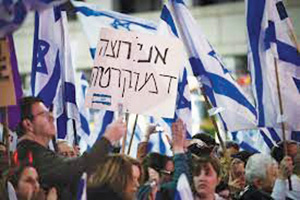 This coming week, the United States—the longest running, and most successful democracy—will be celebrating its Independence Day. This ambitious experiment or “the city on the hill,” has both transformed modern politics and has profoundly shaped contemporary culture. Because democracy has so dramatically advanced society it is, sometimes, over glorified. Intoxicated with democracy, we often ignore its inner flaws, and we don’t sufficiently acknowledge the hazards it poses to religion. Democracy is so fashionable and so revered that it becomes its own religion, blinding us to its own anti-religious demons.
This coming week, the United States—the longest running, and most successful democracy—will be celebrating its Independence Day. This ambitious experiment or “the city on the hill,” has both transformed modern politics and has profoundly shaped contemporary culture. Because democracy has so dramatically advanced society it is, sometimes, over glorified. Intoxicated with democracy, we often ignore its inner flaws, and we don’t sufficiently acknowledge the hazards it poses to religion. Democracy is so fashionable and so revered that it becomes its own religion, blinding us to its own anti-religious demons.
Individual Freedom
Democracy successfully liberated humanity from centuries of repressive totalitarian rule, offering each individual political liberty and personal freedom. Democracy’s emphasis upon the individual and their essential freedoms clashes with religion’s stress upon our submission to Hashem and His mitzvot.
Furthermore, democracy fosters individualism whereas religion asserts collectivism. Religious identity is pivoted upon belonging to broader “networks” beyond our own selves such as community and historical nationhood. While religion attempts to stretch our imagination beyond ourselves and, beyond our needs, democracy often traps us in narrow prisons of self-interest, locking us in a withered cell of individualism.
Rights or Duties?
Additionally, by highlighting the inalienable rights of every human being, democracy prioritizes privileges and entitlements over duties and responsibilities. Preservation of rights is paramount, but as a precondition for human well-being, so that, ultimately, human beings with rights can better express their duties. These are just a few of the areas in which democratic values deviate from religious sensibilities and from ritual life.
Distortion of ‘Equality’
In the broader social arena, democracy often distorts our moral thinking. Democracy seeks to bestow political equality, empowering each citizen with equal influence in government and its policies. However, political equality is often confused with other types of equality. Just because everyone is equal in the ballot-box doesn’t mean they are also equal in the moral conversation.
This misconstrued notion of equality has produced a confused world, bereft of absolute moral opinions and absent of clear divisions between “right” and “wrong.” Suffering under the “spell” of moral relativism, society struggles to assign absolute moral positions. Each and every viewpoint must be accredited, and every personal perspective must be validated. A terrorist is, merely, a “freedom fighter” restoring violated national pride. Worse, radical political correctness suffocates free speech and hijacks meaningful conversation. Only “safe” and meaningless speech is tolerated.
Scrubbing Identity
Absolute equality is also creating a crisis of identity. Previous societies were built upon rigid political, social, racial and economic hierarchies, with limited opportunity for upward mobility. These hierarchies were oppressive, but they also provided clear and unmistakable value systems upon which to build identity.
With the abolition of hierarchies and the expansion of freedom, a crisis of identity has emerged. In a world in which the only undisputable value is freedom, every other value is “up for grabs,” and, ultimately, we start to ask ourselves, “Who am I?” If religion, morality, nationality or even gender aren’t assumed and there are no longer any objectives or absolutes, identity becomes quicksand. In an endless carnival of values, we no longer have clear identity anchors.
Should Israel Be Democratic?
In Israel—in addition to pondering the religious and moral challenges of democracy—we struggle with an even broader question: Should our state be a pure democracy? Undeniably, our homeland must be structured upon a foundation of democratic values. In our daily prayers, prior to petitioning for a return to Jerusalem, we pray both for the restoration of a righteous government and for ethical leaders. Our return to Yerushalayim—the city of justice—can only be enabled through a moral political system. Our return home was delayed until the world discovered democracy.
One day, Hashem will restore our theocracy and install Mashiach as a benevolent monarch, but until that day, democracy is the best and fairest form of government which humans have imagined, and it must serve as the political platform of our historical return.
Yet—despite its value—democracy is not the highest or most supreme value. Israel is the Jewish historical homeland which we have, collectively, longed for across time and space. Through every race, religion and nationality must be afforded equal rights, personal dignity and religious freedom, our state must retain its Jewish character. For many, the very thought that Israel should not be a pure democracy is heretical. For religious people, it should be obvious. Democracy is an indispensable feature of the state we are assembling, but it is not the overriding feature. Israel must first be historical and, only afterwards, democratic.
Upholding Democracy
Just the same, and given all the potential hazards to religion, it is fair to ask whether religious people sufficiently value democracy and sufficiently uphold its principles. I fear that—given all its flaws—democracy is too often taken for granted and even vilified by religious people. If we critique its potential hazards, we must first reinforce our support of it.
Though democracy traces its origins to ancient Greece, its modern incarnation stems from the 17th century, as philosophers—primarily British—began to articulate its principles. In the 18th century these ideals became embodied in the American and French Revolutions. Initially, democracy drew inspiration from the Bible and from our Jewish traditions. God—not man is the ultimate authority—and He invested every man with dignity and with freedom of conscience. Humans are religiously bound to preserve this divine dignity and to assure that God’s creatures could exercise their moral agency. Ironically—especially in the United States—while religion was formally separated from politics, it still wielded significant influence, both in individual identity and in communal life.
It may seem odd to the modern perspective, but democracy had deep roots in religion. At its best, Democracy is a political instinct delivered by Hashem enabling man to protect the divine potential which Hashem Himself endowed.
In the past two centuries, democracy and its offshoot—capitalism—have dramatically improved the human condition—eliminating hunger and poverty as causes of death—and fueling industrialization, scientific discovery and technological advance. One of the core tenets of monotheism is that Hashem covets the improvement of the human condition. He isn’t arbitrary or indifferent, but desires human welfare. Any political system which enhances human welfare is a divine gift to man.
Jews, in particular, must cherish the freedom of worship which democracy has offered. For the first time since we were evicted from our homeland, we enjoyed absolute and unconditional freedom to practice our religion without discrimination. For the first time in exile, we were treated as equal members of society, enjoying full rights and equal opportunities. Until recently, democracies also protected us against antisemitism. The fact that, sadly, certain elements of modern democracies have fueled new antisemitism shouldn’t obscure the considerable manner in which democracies have curbed antisemitism.
Religious Jews must deeply value democracy, despite its religious challenges and despite some of the modern expressions of democratic culture. Sadly, the term “liberalism,” which is so foundational to democracy, has been twisted to reflect values which are often incongruent with religion.
Ideally, the principles of liberalism demand that we respect people who behave differently from us and protect their freedom, even if we sharply disagree with their views. Unfortunately, this term has been commandeered and perverted to reflect very different cultural perspectives. However, we can’t overreact, and we must not reject liberal values simply because the term has been radicalized. Don’t allow others to steal your terminology and to disqualify important values. Religious people should cherish democracy and practice liberal values while rejecting much of modern liberalist ideology.
The writer is a rabbi at Yeshivat Har Etzion/Gush, a hesder yeshiva. He has semicha and a BA in computer science from Yeshiva University as well as a masters degree in English literature from the City University of New York.










